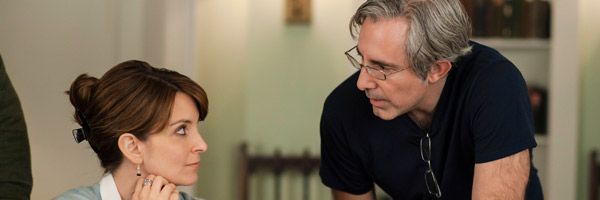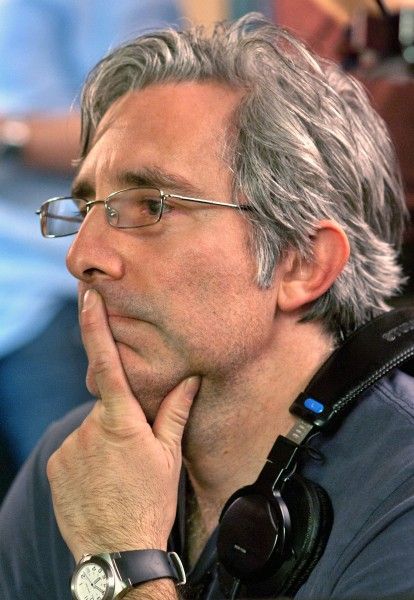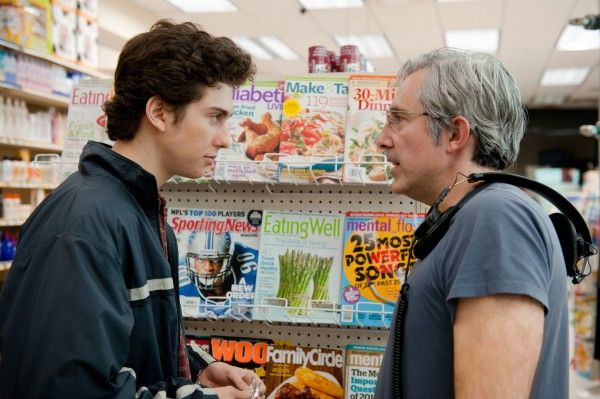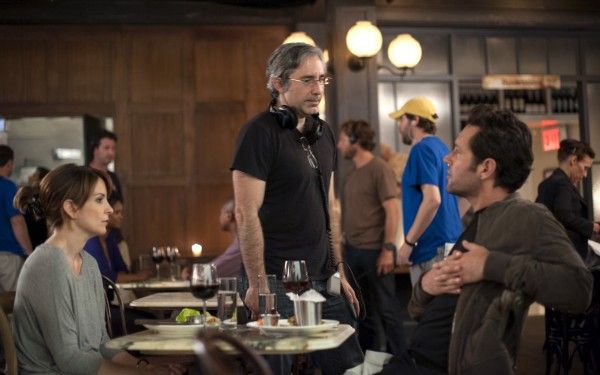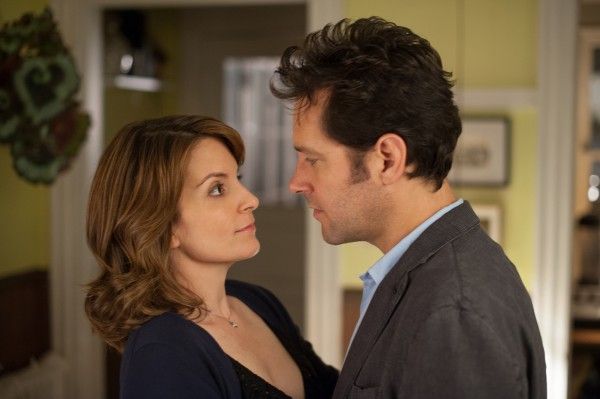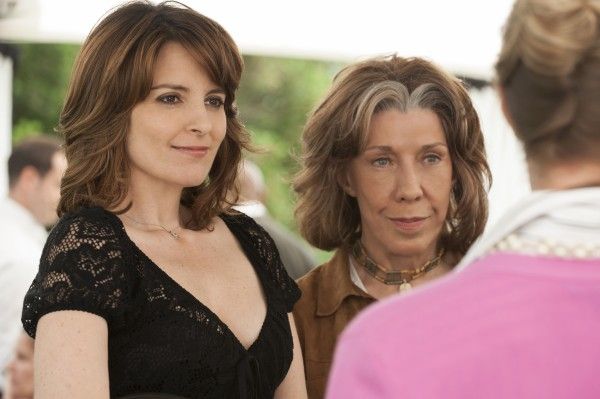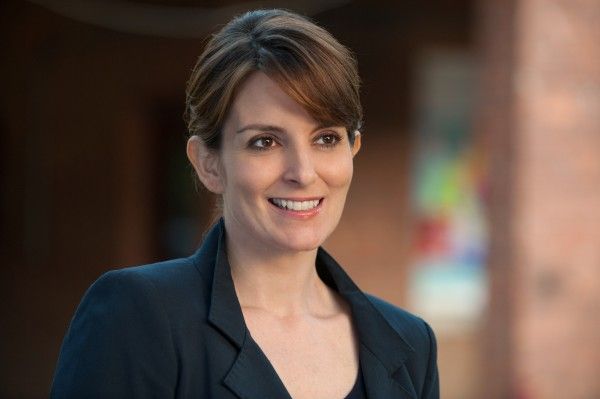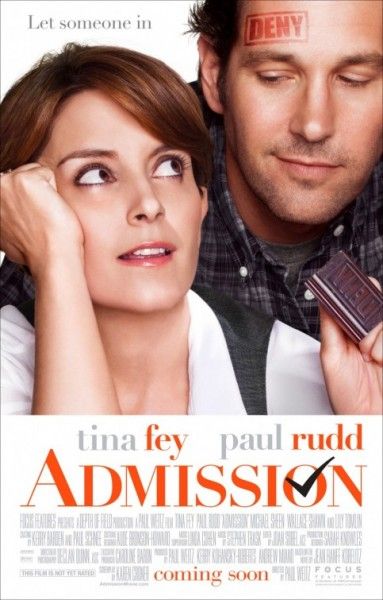Director Paul Weitz’s new film Admission turns an inside eye on a subject near and not-so-dear to many of us- the college admissions process. At the heart of it is Portia Nathan (played by a more serious Tina Fey than we are used to seeing), a Princeton admissions officer whose world is suddenly thrown for a loop when a routine visit to an alternative school forces her to cross paths with a teacher (Paul Rudd) who thinks he may have found the son Portia gave up for adoption in college. Portia finds herself bending the rules, both official college rules and rules she has imposed upon herself to help this boy (Nat Wolff) get into Princeton, while falling into an oddly sweet relationship with his teacher. The film also stars a hilarious Lily Tomlin as Fey’s feminist, fire-breathing mother.
Recently I landed an exclusive interview with director Paul Weitz. He talked about the process of turning this book into a script, working with stars Tina Fey, Paul Rudd and Lily Tomlin, deleted scenes and Lily Tomlin’s outrageous tattoo ideas, working with his brother Chris Weitz and writing for Woody Allen in Antz. Click after the jump to continue reading.
Collider: I want to know about your college admissions experience, what was that like for you?
Paul Weitz: Um, ok well. I grew up in Manhattan in an apartment building and during high school I had a deal with the doormen where when I got a report card they would hold onto it, before my parents would get it, which meant that I could alter the report card. And consequently my parents thought I was a much better student, thought I had a much better GPA than I actually did. So the school I went to, the college guidance counselor would have a meeting with your parents and I remember at the meeting my dad was like well, he’s going to go to Harvard, Princeton or Yale. And the guidance counselor was like he doesn’t have the grades for that and [laughs] I knew what the disconnect was. Luckily, I ended up going to a place that was really good for me personally, which was Wesleyan. And I went to an all boys school and it was very good for me to go a school with a strong feminist contingent. And I had a really good experience in college. I think that the whole aspect of getting into a particular school is a trap, no matter if it’s college or kindergarten, it’s hogwash. And it’s dehumanizing, and as long as your kid is safe and has access to things they want to learn about, that’s the only thing you can control. In terms of people that I’ve known who’ve gone to sort of elite institutions, that’s kind of the world that I grew up in, there seems to be a total disconnect between whether they’re successful in life and where they want to school.
How long was your first assembly cut of this movie?
Weitz: [Laughs] Um...
Because it’s a strongly paced film.
Weitz: Thanks. Do you mean it’s fast?
No I mean, it’s long but it moves.
Weitz: Cool. It wasn’t dreadful, it was 2 hours and 15 minutes. Sometimes you get to the edit room and the rough cut’s like 3 hours and you’re like oh my god, is this thing gonna lose the patient in the surgery? Luckily, with this kind of film, you don’t have enough time in the shooting schedule to shoot like a whole mess of stuff that you’re pretty sure you’re not going to use. So I had to cut some stuff and I had to cut stuff that I liked, and that’s always the case. And that’s absolutely the worst part of directing, calling up an actor and saying ‘hey, your scene was cut I’m really sorry you did a good job.’
What were some of the scenes that got cut?
Weitz: There was a scene where, and it’s actually in the trailer, where the actor did an excellent job, he was a stunt man, because he had to run after Tina’s car. And he’s trying to offer her bunt cake, and he’s saying that his daughter’s a genius and stuff like that. And then just, I was at the point where I had to cut a whole bunch of stuff and that was one of the only things that wasn’t linked to anything else, cause you can’t stuff that’s going to destroy the logic of the story or something. So I feel awful about that. And I don’t know whether it’s better or worse that it’s in the trailer actually, like a little moment from it.
Yeah, I remember seeing that and wondering where that went. Do you think we’ll see the deleted scenes on the DVD?
Weitz: Maybe. I mean...I always wonder...I used to want to do all that sort of stuff, and then I realized you’re just sort of showing your failings. But um, which is interesting to see if you’re a filmmaker trying to learn stuff. I don’t know, do you like deleted scenes?
I personally like them, I like when they’re in a separate area so you have to seek them out. So if you choose to watch them it’s your choice.
Weitz: Yeah, maybe I should do it.
I think so. If you do it I get credit.
Weitz: Yeah, yeah.
You participated in the writing of the script, how was that for you, collaborating on writing it?
Weitz: Usually I’ve kind of written my stuff from the ground up, in this case Karen Croner, the writer, I’ve known her for a long time, and she’s part of a group of actually NPR hosts and stuff. She’s not an NPR host but she’s pals with Jackie Lyden and Ray LaMontagne and stuff. And they’re, I wasn’t even thinking about it but meeting, knowing those people for a little while probably informed Tina’s character. In other words, they’re people who may or may not be in relationships but they’re fine, either way. There’s no value judgment ascribed to whether you are single, or in a marriage, or whether you have kids or not. And they’re strong women. And so I was, in this case, very happy to be collaborating with somebody who I like so much, and who was doing a really good job. It’s nice to have somebody who, after the first draft, which she did on her own, I would go off and we’d be throwing, shooting stuff back and forth basically. So it was a lot of fun. And then we would keep tabs with Tina, even before writing the script I sat down with her and went over the plot.
Tell me a little bit more about that development process with her and when you knew you wanted her to play the lead and how things changed for her specifically.
Weitz: Well I knew from the get-go that I wanted her to play the lead. To the extent that if she didn’t do it I was probably not going to do the movie. So, I needed her to know exactly what I was thinking of before wasting anybody’s time and moving ahead with the script. And there were some big story decisions that I was making. So I sat down with her and I’m sure her eyes were rolling into the back of her head but I pitched out the story beat by beat, and I said ‘how do you feel about this particularly big plot point,’ and she said ‘okay, I think that’s the way to go with it.’ So then I knew we’d be okay essentially. You know I had genuine confidence that she’d be able to do it really well. And so it was a good collaboration.
Tell me about being on set with not just Tina, with Paul and with Lily Tomlin and the rest of the cast.
Weitz: It was really exciting working with Lily and I loved her work with Robert Altman so much, especially Nashville, which is not a comedic character at all. She’s, as are a lot of actors of her generation, deeply devoted to trying to be honest while she’s acting. Which meant that when she was fixing the bike in her first scene with Tina, she actually had to be fixing a bike, [laughs] and learn how to fix a bike, which is insane-making. It was more of a juggling act than it otherwise would have been, even if the shot was above her hands or whatever she’s doing, she wanted to be doing it. I think there’s people whose eccentricities come from their passion, and I would put her in that category. A lot of those actors, behemoth actors of the 70’s, are like that. I mean she’s a comedic icon, but also she’s of that era of really great films. And you know, you know that they have, that they’re tigers and they can swipe your head off if you press their buttons in the wrong way. But I really like that. As a director sometimes, rarely but sometimes, you come across an actor who’s just deeply unhappy with themselves and the world. And it’s really hard to concentrate when you’re directing somebody like that. And then you run across people who can get upset, but it’s coming from feeling like they’re not doing a good job or that they’re detached from the character and I love that. Cause it’s so important to them, and I love being part of that process of erasing the boundary between them and the character.
Lily’s tattoo. Tell me about that.
Weitz: [MINOR SPOILER] Yeah I was really happy that she had the idea of having a Bella Abzug tattoo, because that meant something to me. She had a bunch of other tattoo ideas, which unfortunately I wouldn’t have been able to shoot because they all involved a fair amount of nudity. [Laughs]. But yeah, I really liked that idea, and that she hooks up with Oleg Krupa’s character, I like that little romance in it.
What do you think was the most fun that you’ve had shooting a film?
Weitz: Wow. Um. They’re all pretty fun. Except for one. Because it’s just, there’s something really magical about having a defined role, i.e. sort of being the director, you know. It erases my particular neuroses and my inability to make decision on the set, I’m able to make decisions really fast. It’s really fun, helping an actor pretend to the point where they’re able to be in the moment while all this mechanical apparatus is going on. It’s really fun dealing with a crew, they’re all really fun. I mean American Pie was really great because we had no idea if stuff would cut together frankly, because we hadn’t done it before, so that was exciting. Uh, and, you know, it’s been a little while since I’ve worked with my brother [filmmaker Chris Weitz] but it was fun working with him. They’re all fun. Being Flynn was really fun. It was a pretty hardcore story that it was based on, but it meant so much to me that it felt like, like a dream to be making it.
And the experience of working with Woody Allen in Antz?
Weitz: I mean, we wrote that for Woody Allen, and he didn’t diverge from the text that we wrote. I actually got to sit in the room and record his, read the other dialogue while he was recording. I don’t know if he understood that I had written the dialogue, along with my brother...it was uh, I mean it was...he was pretty opaque, I would say. It was like getting to be around your idol, but in the sense of being a fly on the wall. And so, unfortunately there was no, we didn’t get to interact with him on any meaningful level.
How was working with your brother?
Weitz: It was really fun and then now we’ll look at the cuts of each other’s films and try to help each other out and be supportive. I know that if I ever have a hard time I’ll call him up and he’ll talk me off the ledge. We have office together and a company together so it’s really nice, even though we’re directing individually now. Yeah so it’s good.
No sibling rivalry?
Weitz: Really no, I think that we both know how tough it can be, this is a strange job and it’s great to have somebody who’s done the same job to talk about it with, cause it’s such a strange set of issues that you’re dealing with.
What’s coming up next for you?
Weitz: Um, I’m writing a couple of original stories, and then I’m working, I’m just beginning to work on an adaptation of the novel Bel Canto which is a novel that’s been around a while that’s a really fantastic novel that’s produced by the people who did Capote. And the wife of the husband and wife team was a producer of this film and of Being Flynn.
What’s your favorite genre of movie to watch?
To watch? It’s this kind of movie. Comedy dramas.
And your favorite to direct?
Um, yeah. They’re probably my favorite to direct. I mean directing anything, like I say, is pretty great. Stuff where you’re not spending a lot of time doing visual effects is nice. Cause that can be really slow going.
Do you like animation?
Um. Animation takes an incredibly long time in my experience. And uh, I’m aware that 90% of films will be animated within the next 10 years. I’m hopefully being facetious. I like it but I know how much time it takes, so I don’t have any illusions about how easy it is.
My last question- film or digital?
Uh...film. Which I probably will never shoot again.
You shot film on this?
No. Oh I’m sorry, we shot digital on this. I like the aspect of film where you don’t actually know what you shot and you’re just crossing your fingers. I think that’s really cool.

